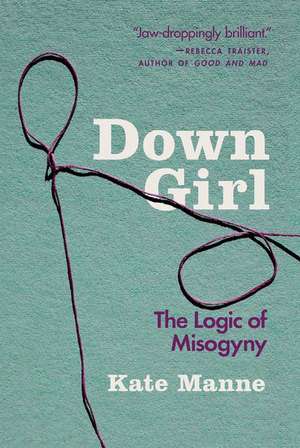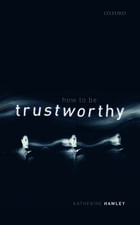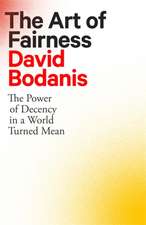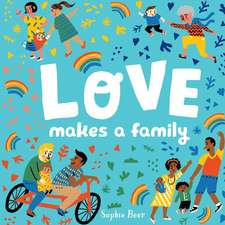Down Girl: The Logic of Misogyny
Autor Kate Manneen Limba Engleză Paperback – 30 apr 2019
The paperback features a new preface to the paperback edition discussing the extensive publicity and discussion that accompanied hardcover publication.
| Toate formatele și edițiile | Preț | Express |
|---|---|---|
| Paperback (2) | 54.22 lei 25-31 zile | +20.85 lei 5-11 zile |
| Penguin Books – 28 feb 2019 | 54.22 lei 25-31 zile | +20.85 lei 5-11 zile |
| Oxford University Press – 30 apr 2019 | 95.99 lei 22-36 zile | |
| Hardback (1) | 195.38 lei 10-16 zile | +49.76 lei 5-11 zile |
| Oxford University Press – 28 dec 2017 | 195.38 lei 10-16 zile | +49.76 lei 5-11 zile |
Preț: 95.99 lei
Nou
Puncte Express: 144
Preț estimativ în valută:
18.37€ • 19.23$ • 15.29£
18.37€ • 19.23$ • 15.29£
Carte disponibilă
Livrare economică 10-24 martie
Preluare comenzi: 021 569.72.76
Specificații
ISBN-13: 9780190933203
ISBN-10: 0190933208
Pagini: 320
Dimensiuni: 140 x 210 mm
Greutate: 0.34 kg
Editura: Oxford University Press
Colecția OUP USA
Locul publicării:New York, United States
ISBN-10: 0190933208
Pagini: 320
Dimensiuni: 140 x 210 mm
Greutate: 0.34 kg
Editura: Oxford University Press
Colecția OUP USA
Locul publicării:New York, United States
Descriere
Misogyny
is
a
hot
topic,
yet
it's
often
misunderstood.
What
is
misogyny,
exactly?
Who
deserves
to
be
called
a
misogynist?
How
does
misogyny
contrast
with
sexism,
and
why
is
it
prone
to
persist
—
or
increase
—
even
when
sexist
gender
roles
are
waning?
This
book
is
an
exploration
of
misogyny
in
public
life
and
politics,
by
the
moral
philosopher
and
writer
Kate
Manne.
It
argues
that
misogyny
should
not
be
understood
primarily
in
terms
of
the
hatred
or
hostility
somemen
feel
toward
all
or
most
women.
Rather,
it's
primarily
about
controlling,
policing,
punishing,
and
exiling
the
"bad"
women
who
challenge
male
dominance.
And
it's
compatible
with
rewarding
"the
good
ones,"
and
singling
out
other
women
to
serve
as
warnings
to
those
who
are
out
of
order.
It's
alsocommon
for
women
to
serve
as
scapegoats,
be
burned
as
witches,
and
treated
as
pariahs.Manne
examines
recent
and
current
events
such
as
the
Isla
Vista
killings
by
Elliot
Rodger,
the
case
of
the
convicted
serial
rapist
Daniel
Holtzclaw,
who
preyed
on
African-American
women
as
a
police
officer
in
Oklahoma
City,
Rush
Limbaugh's
diatribe
against
Sandra
Fluke,
and
the
"misogyny
speech"
of
Julia
Gillard,
then
Prime
Minister
of
Australia,
which
went
viral
on
YouTube.
The
book
shows
how
these
events,
among
others,
set
the
stage
for
the
2016
US
presidential
election.
Not
only
was
themisogyny
leveled
against
Hillary
Clinton
predictable
in
both
quantity
and
quality,
Manne
argues
it
was
predictable
that
many
people
would
be
prepared
to
forgive
and
forget
regarding
Donald
Trump's
history
of
sexual
assault
and
harassment.
For
this,
Manne
argues,
is
misogyny's
oft-overlooked
and
equallypernicious
underbelly:
exonerating
or
showing
"himpathy"
for
the
comparatively
privileged
men
who
dominate,
threaten,
and
silence
women.
Recenzii
Down
Girl
leaves
the
reader
wanting
more,
and
Manne
eagerly
invites
both
scholars
and
her
general
audience
to
fill
in
those
gaps.
Rich
conversations
and
literatures
will
surely
follow
in
this
book's
wake.
Despite its somber topic, Kate Manne's Down Girl made me very happy, exhilarated indeed by its insight, analytical clarity, and committed engagement with a major issue of justice. I've been thinking and teaching about sexism and misogyny for a long time, but this book opened up fresh perspectives, for example in its convincing distinction between sexism as a set of beliefs and misogyny as an enforcement strategy. Each thoughtful person will have her ownsense of where to locate the root of injustice to women, but Manne's cogent argument that misogyny is primarily about the demand that women give support, service, and care is surely at least one big part of the story of our turbulent times.
Persuasively defining 'misogyny' as hostile, demeaning, shaming, and punitive treatment of women, Down Girl brings out the misogynist logic of contemporary culture with wit and urgency. In this book 'misogyny' emerges as the law enforcement branch of patriarchy, and thus as a concept that fully deserves a place alongside 'patriarchy' and 'sexism' as a fundamental tool for feminist analysis. Combining conceptual clarity with passionate commitment, DownGirl is indispensable reading for anyone who wishes to understand the ugly strand of hostility to women that has surfaced in recent years in our so-called advanced Western societies.
Kate Manne's brilliant Down Girl is a welcome antidote to the view that philosophy is
Kate Manne has written a deeply moving and powerful book. It is politically engaged philosophical analysis at its best.
Manne's important new book deploys the tools of analytic moral philosophy to construct an arresting account of the logic of misogyny. It is sure to become a key reference point for future discussions of this vital, but hitherto sadly neglected, topic.
Manne offers us a deep, insightful, and thought-provoking
Manne's Down Girl: The Logic of Misogyny is excruciatingly well-timed, providing a theoretical framework for a phenomenon baring itself before us, perverse and pervasive... Down Girl reminds us that while revealing individual misogynists is hard, uprooting misogyny is much harder.
Manne brings a fresh analysis to our assumed understanding of misogyny and the related term sexism. As a feminist and moral philosopher... not a single book or article-length treatment [in the field] had been devoted to unpacking what it is and how it works. Historians, pay attention. Manne has stepped up to fill this gap... Manne as a feminist philosopher breaks new ground in a field that is in need of new perspectives...Having fought for recognition for thelegitimacy of their method, feminist philosophers are firmly committed to excavating the political, epistemological, and moral aspects of gender relations. Down Girl should encourage historians who trace changes in the meaning and the context of language to revisit some of the old standby terms of feminism.
Down Girl: The Logic of Misogyny by feminist philosopher Kate Manne... argues that misogyny pits women against each other: the good wife vs. "feminazis." At a time when high-profile sexual predators have been exposed, I can't imagine a more relevant read.
Kate Manne's Down Girl: The Logic of Misogyny provides an important and compelling analysis of a phenomenon that's everywhere. Out of Manne's thoughtful analysis, of not just much-debated high-profile events but also everyday experiences, emerge insight after insight into the what, why, when, and how of misogyny. Manne also gifts us a marvelous neologism to capture the exculpatory and even empathic attitudes sometimes expressed towards misogynistic men:"himpathy.
This new book from Kate Manne, a professor of philosophy at Cornell University, makes a compelling argument for treating misogyny as a culture-wide system, not just a matter of individual bigotry.
It is difficult to imagine a more timely moment for Down Girl: The Logic of Misogyny. Manne is a professor of philosophy at Cornell University, and she uses the abstract tools of her discipline to parse current events. Her guiding question is as troubling as it is straightforward-to quote the comedian John Oliver: "Why is misogyny still a thing?" Within the parameters that Down Girl sets for itself, the account of misogyny it provides is compelling.
Cornell University philosophy professor Kate Manne is on a mission to define "misogyny." While we're culturally familiar with sexism, Manne argues in her forthcoming book Down Girl: The Logic of Misogyny that misogyny has been woefully conflated with sexism though they have different uses. Misogyny, in Manne's estimation, is about "controlling, policing, punishing, and exiling the 'bad' women who challenge male dominance." Through the lens of the 2016election as well as the 2014 Isla Vista killings, the case of serial rapist Daniel Holtzclaw, Rush Limbaugh's "slut" rant against Sandra Fluke, and other news events, Manne outlines the danger of misogyny, and explains how we can collectively resist it.
Down Girl is a must-read and should be in every feminist's library...[L]ong after reading it, I've found myself going back to it, quoting from it and rereading sections. Her analogies used to explain misogyny's many forms, provide much needed clarity; Manne also parses the difference between sexism vs. misogyny. In my opinion Down Girl is destined to become a feminist literary classic alongside the likes of The Beauty Myth by Naomi Wolf orBetty Friedan's The Feminine Mystique.
In her new book, Down Girl: The Logic of Misogyny, Kate Manne examines an unfortunately ubiquitous reality through an intriguing lens. Manne, who teaches philosophy at Cornell, looks at misogyny from the perspective of power: rather than focus on whether individual men are misogynists or feel deep hatred for women, we would do well to spend more time wrestling with the power structures that not only allow for endless sympathy and space for men's poorbehavior, but also-most crucially-help teach men that women are supposed to behave in certain ways.
What We're Reading: A compelling conversation [by Isaac Chotiner, Slate, see above] with Kate Manne, a professor of philosophy at Cornell University and the author of a new book on structural misogyny, may change the way you think about the #MeToo moment. She makes a case for treating the wave of revelations as an opportunity to re-examine a culture-wide system of discrimination, not just individual instances of bigotry and harassment.
What is misogyny? How is it different from sexism? And why does the male-dominated status quo seem to persist? A new book by Cornell philosophy professor Kate Manne has answers. She argues that misogyny is not about male hostility or hatred toward women-instead, it's about controlling and punishing women who challenge male dominance. Misogyny rewards women who reinforce the status quo and punishes those who don't...This book calls attention to the roles we all playin society, roles that we're assigned at birth and rarely question, and how we punish people-especially women-when they defy those roles.
In the fiercely argued and timely study Down Girl: The Logic of Misogyny (Oxford), the philosopher Kate Manne makes a consonant argument [with anthropologist Alan Fiske and psychologist Tage Rai] about sexual violence. "The idea of rapists as monsters exonerates by caricature," she writes, urging us to recognize "the banality of misogyny," the disturbing possibility that "people may know full well that those they treat in brutally degrading and inhuman waysare fellow human beings, underneath a more or less thin veneer of false consciousness...There has always been something optimistic about the idea that our worst acts of inhumanity are based on confusion. It suggests that we could make the world better simply by having a clearer grasp of reality... The truthmay be harder to accept: that our best and our worst tendencies arise precisely from seeing others as human.
Kate Manne has written an urgently relevant, brilliant but accessible analysis of how patriarchy functions within our context...Brilliant discussions of "himpathy," victim blaming, and other related subjects follow...Manne's analysis is unflinching and, as things stand right now, there is little room for hope that the big picture is going to improve any time soon. This is very highly recommended reading. Hands down, one of the best books of the year.
This timely work of practical philosophy argues that misogyny is not defined by any private emotion or motivation-such as hostility or hatred toward women-but rather by a social function-controlling and punishing women who challenge male dominance while rewarding women who reinforce the status quo.
Kate Manne's Down Girl: The Logic of Misogyny is the most important book I've read this year... While Manne doesn't solve the problem or give us a neat or hopeful answer, understanding misogyny is an important first step, so we can recognize it and break the silence that enables it.
Manne is a superb philosopher. Her feminist critiques are not just compelling but plainly stated. In this study, which I've been eagerly waiting for all year, she analyzes the systematic misogyny and sexism built into our culture and politics. It is a vital work demonstrating just how women are policed and silenced...it is one of the best books I've read this year.
A big, ambitious and engrossing book, Down Girl raises the questions we should all be asking...Manne's equanimity and epistemological delicacy further the debate, closing in on predators such as Weinstein and bullies such as Trump with more than good intent. She comes at the problem of misogyny from all angles, tearing it apart.
This is the type of book that should be required reading for everyone. It uses historical and statistical evidence to prove that misogyny has woven its way into the very thread of society. The book illustrates how it's so ingrained in our culture that people of both genders rarely seem aware of it, much less critical of it. Often, it becomes such a norm in our society, that we fail to recognize its extensive effects on our everyday lives. Which is exactly why thisbook is so needed...if you're looking for a book to start off your year with, "Down Girl" is an awesome choice. It's informative, eye-opening, and necessary. Leave 2017 behind. Take on 2018 head first with a real knowledge of how our world is currently working, and a better understanding of what youcan do to change that.
Manne's book is a forensic and clever analysis which provides the cogs and wheels of how the system of patriarchal policing works, in our minds, as well as in our world... a prescient work, which proves particularly helpful when facing the news cycle each new day.
Despite its somber topic, Kate Manne's Down Girl made me very happy, exhilarated indeed by its insight, analytical clarity, and committed engagement with a major issue of justice. I've been thinking and teaching about sexism and misogyny for a long time, but this book opened up fresh perspectives, for example in its convincing distinction between sexism as a set of beliefs and misogyny as an enforcement strategy. Each thoughtful person will have her ownsense of where to locate the root of injustice to women, but Manne's cogent argument that misogyny is primarily about the demand that women give support, service, and care is surely at least one big part of the story of our turbulent times.
Persuasively defining 'misogyny' as hostile, demeaning, shaming, and punitive treatment of women, Down Girl brings out the misogynist logic of contemporary culture with wit and urgency. In this book 'misogyny' emerges as the law enforcement branch of patriarchy, and thus as a concept that fully deserves a place alongside 'patriarchy' and 'sexism' as a fundamental tool for feminist analysis. Combining conceptual clarity with passionate commitment, DownGirl is indispensable reading for anyone who wishes to understand the ugly strand of hostility to women that has surfaced in recent years in our so-called advanced Western societies.
Kate Manne's brilliant Down Girl is a welcome antidote to the view that philosophy is
Kate Manne has written a deeply moving and powerful book. It is politically engaged philosophical analysis at its best.
Manne's important new book deploys the tools of analytic moral philosophy to construct an arresting account of the logic of misogyny. It is sure to become a key reference point for future discussions of this vital, but hitherto sadly neglected, topic.
Manne offers us a deep, insightful, and thought-provoking
Manne's Down Girl: The Logic of Misogyny is excruciatingly well-timed, providing a theoretical framework for a phenomenon baring itself before us, perverse and pervasive... Down Girl reminds us that while revealing individual misogynists is hard, uprooting misogyny is much harder.
Manne brings a fresh analysis to our assumed understanding of misogyny and the related term sexism. As a feminist and moral philosopher... not a single book or article-length treatment [in the field] had been devoted to unpacking what it is and how it works. Historians, pay attention. Manne has stepped up to fill this gap... Manne as a feminist philosopher breaks new ground in a field that is in need of new perspectives...Having fought for recognition for thelegitimacy of their method, feminist philosophers are firmly committed to excavating the political, epistemological, and moral aspects of gender relations. Down Girl should encourage historians who trace changes in the meaning and the context of language to revisit some of the old standby terms of feminism.
Down Girl: The Logic of Misogyny by feminist philosopher Kate Manne... argues that misogyny pits women against each other: the good wife vs. "feminazis." At a time when high-profile sexual predators have been exposed, I can't imagine a more relevant read.
Kate Manne's Down Girl: The Logic of Misogyny provides an important and compelling analysis of a phenomenon that's everywhere. Out of Manne's thoughtful analysis, of not just much-debated high-profile events but also everyday experiences, emerge insight after insight into the what, why, when, and how of misogyny. Manne also gifts us a marvelous neologism to capture the exculpatory and even empathic attitudes sometimes expressed towards misogynistic men:"himpathy.
This new book from Kate Manne, a professor of philosophy at Cornell University, makes a compelling argument for treating misogyny as a culture-wide system, not just a matter of individual bigotry.
It is difficult to imagine a more timely moment for Down Girl: The Logic of Misogyny. Manne is a professor of philosophy at Cornell University, and she uses the abstract tools of her discipline to parse current events. Her guiding question is as troubling as it is straightforward-to quote the comedian John Oliver: "Why is misogyny still a thing?" Within the parameters that Down Girl sets for itself, the account of misogyny it provides is compelling.
Cornell University philosophy professor Kate Manne is on a mission to define "misogyny." While we're culturally familiar with sexism, Manne argues in her forthcoming book Down Girl: The Logic of Misogyny that misogyny has been woefully conflated with sexism though they have different uses. Misogyny, in Manne's estimation, is about "controlling, policing, punishing, and exiling the 'bad' women who challenge male dominance." Through the lens of the 2016election as well as the 2014 Isla Vista killings, the case of serial rapist Daniel Holtzclaw, Rush Limbaugh's "slut" rant against Sandra Fluke, and other news events, Manne outlines the danger of misogyny, and explains how we can collectively resist it.
Down Girl is a must-read and should be in every feminist's library...[L]ong after reading it, I've found myself going back to it, quoting from it and rereading sections. Her analogies used to explain misogyny's many forms, provide much needed clarity; Manne also parses the difference between sexism vs. misogyny. In my opinion Down Girl is destined to become a feminist literary classic alongside the likes of The Beauty Myth by Naomi Wolf orBetty Friedan's The Feminine Mystique.
In her new book, Down Girl: The Logic of Misogyny, Kate Manne examines an unfortunately ubiquitous reality through an intriguing lens. Manne, who teaches philosophy at Cornell, looks at misogyny from the perspective of power: rather than focus on whether individual men are misogynists or feel deep hatred for women, we would do well to spend more time wrestling with the power structures that not only allow for endless sympathy and space for men's poorbehavior, but also-most crucially-help teach men that women are supposed to behave in certain ways.
What We're Reading: A compelling conversation [by Isaac Chotiner, Slate, see above] with Kate Manne, a professor of philosophy at Cornell University and the author of a new book on structural misogyny, may change the way you think about the #MeToo moment. She makes a case for treating the wave of revelations as an opportunity to re-examine a culture-wide system of discrimination, not just individual instances of bigotry and harassment.
What is misogyny? How is it different from sexism? And why does the male-dominated status quo seem to persist? A new book by Cornell philosophy professor Kate Manne has answers. She argues that misogyny is not about male hostility or hatred toward women-instead, it's about controlling and punishing women who challenge male dominance. Misogyny rewards women who reinforce the status quo and punishes those who don't...This book calls attention to the roles we all playin society, roles that we're assigned at birth and rarely question, and how we punish people-especially women-when they defy those roles.
In the fiercely argued and timely study Down Girl: The Logic of Misogyny (Oxford), the philosopher Kate Manne makes a consonant argument [with anthropologist Alan Fiske and psychologist Tage Rai] about sexual violence. "The idea of rapists as monsters exonerates by caricature," she writes, urging us to recognize "the banality of misogyny," the disturbing possibility that "people may know full well that those they treat in brutally degrading and inhuman waysare fellow human beings, underneath a more or less thin veneer of false consciousness...There has always been something optimistic about the idea that our worst acts of inhumanity are based on confusion. It suggests that we could make the world better simply by having a clearer grasp of reality... The truthmay be harder to accept: that our best and our worst tendencies arise precisely from seeing others as human.
Kate Manne has written an urgently relevant, brilliant but accessible analysis of how patriarchy functions within our context...Brilliant discussions of "himpathy," victim blaming, and other related subjects follow...Manne's analysis is unflinching and, as things stand right now, there is little room for hope that the big picture is going to improve any time soon. This is very highly recommended reading. Hands down, one of the best books of the year.
This timely work of practical philosophy argues that misogyny is not defined by any private emotion or motivation-such as hostility or hatred toward women-but rather by a social function-controlling and punishing women who challenge male dominance while rewarding women who reinforce the status quo.
Kate Manne's Down Girl: The Logic of Misogyny is the most important book I've read this year... While Manne doesn't solve the problem or give us a neat or hopeful answer, understanding misogyny is an important first step, so we can recognize it and break the silence that enables it.
Manne is a superb philosopher. Her feminist critiques are not just compelling but plainly stated. In this study, which I've been eagerly waiting for all year, she analyzes the systematic misogyny and sexism built into our culture and politics. It is a vital work demonstrating just how women are policed and silenced...it is one of the best books I've read this year.
A big, ambitious and engrossing book, Down Girl raises the questions we should all be asking...Manne's equanimity and epistemological delicacy further the debate, closing in on predators such as Weinstein and bullies such as Trump with more than good intent. She comes at the problem of misogyny from all angles, tearing it apart.
This is the type of book that should be required reading for everyone. It uses historical and statistical evidence to prove that misogyny has woven its way into the very thread of society. The book illustrates how it's so ingrained in our culture that people of both genders rarely seem aware of it, much less critical of it. Often, it becomes such a norm in our society, that we fail to recognize its extensive effects on our everyday lives. Which is exactly why thisbook is so needed...if you're looking for a book to start off your year with, "Down Girl" is an awesome choice. It's informative, eye-opening, and necessary. Leave 2017 behind. Take on 2018 head first with a real knowledge of how our world is currently working, and a better understanding of what youcan do to change that.
Manne's book is a forensic and clever analysis which provides the cogs and wheels of how the system of patriarchal policing works, in our minds, as well as in our world... a prescient work, which proves particularly helpful when facing the news cycle each new day.
Notă biografică
Kate
Manne
is
Assistant
Professor
of
philosophy
at
Cornell
University,
having
previously
been
a
junior
fellow
at
the
Harvard
Society
of
Fellows
from
2011-2013.
She
works
in
moral,
social,
and
feminist
philosophy.
Her
work
has
appeared
in
The
New
York
Times,
The
Times
Literary
Supplement,
The
Chronicle
of
Higher
Education,
The
Huffington
Post,
and
The
New
Philosopher,
as
well
as
academic
journals.
Her
lead
essay
for
a
forum
onmisogyny
in
The
Boston
Review
was
one
of
their
'25
most-loved
essays'
for
2016.
She
has
also
been
a
winner
of
the
American
Philosophical
Association
(APA)'s
annual
op-ed
contest.













